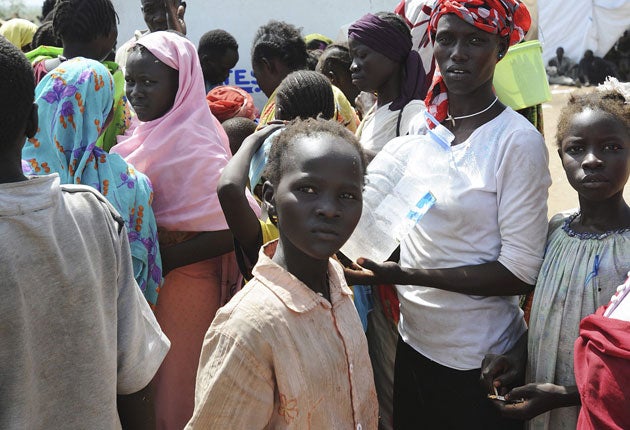Khartoum accused of new wave of Darfur-style ethnic cleansing

Your support helps us to tell the story
From reproductive rights to climate change to Big Tech, The Independent is on the ground when the story is developing. Whether it's investigating the financials of Elon Musk's pro-Trump PAC or producing our latest documentary, 'The A Word', which shines a light on the American women fighting for reproductive rights, we know how important it is to parse out the facts from the messaging.
At such a critical moment in US history, we need reporters on the ground. Your donation allows us to keep sending journalists to speak to both sides of the story.
The Independent is trusted by Americans across the entire political spectrum. And unlike many other quality news outlets, we choose not to lock Americans out of our reporting and analysis with paywalls. We believe quality journalism should be available to everyone, paid for by those who can afford it.
Your support makes all the difference.A Darfur-style crisis is unfolding on the border between north and south Sudan, aid workers have warned, with large-scale ethnic cleansing and bombing of civilians sparking a humanitarian alert.
Fears are rising that the north is taking the country back to war in a late effort to derail the south's bid for independence, due to be formally recognised on 9 July. International aid workers in Southern Kordofan have accused the government in Khartoum of blocking humanitarian efforts, carrying out targeted killings and indiscriminately bombing civilian areas. "Only urgent international efforts can halt what is threatening to become a repeat of what the world has witnessed in Darfur," said one foreign aid worker, speaking on condition of anonymity.
As Africa's largest country prepares to split in two, the north has launched a series of attacks in the oil-rich states on both sides of the future border. The southern government yesterday accused the north of carrying out two bombing raids in the oil-producing Unity State. In recent weeks Khartoum has overrun the disputed enclave of Abyei in violation of international agreements, pushing out the local population and moving in Arab herders from the Misseriya tribe. It has followed this with a campaign against rebels in the Nuba mountains – part of South Kordofan, which is home to thousands of southern civil war fighters that finds itself on the north side of the new border.
"Antonov planes have carried out bombing raids in areas with a significant civilian population," the aid worker said. "Fighter planes have been used to terrify the displaced people seeking shelter around the UN compound."
Northern forces are doing "house-to-house" searches in the towns, he added, pulling out suspected opposition sympathisers and in some cases "killing them on the spot". Humanitarian agencies working in South Kordofan have had their headquarters looted and expatriate staff have fled to the base at the UN Mission in Sudan.
With less than a month to go before the formal separation of the two countries, a decision that was overwhelmingly supported by southerners in a January referendum, Sudan could be on the brink of a return to civil war. Analysts had expected Khartoum to stir trouble in the border area in an effort to win concessions over the future of Sudan's oil reserves but the latest attacks have gone far beyond bargaining manoeuvres.
Southern Kordofan saw some of the worst fighting in the 20-year civil war that ended in 2005. The peace deal called for elections in the troubled state and elsewhere along the disputed border but Khartoum either cancelled voting or overturned results it didn't like.
In South Kordofan a candidate from the political wing of the southern resistance, Abdel Aziz Adam el Hilu, was widely seen to have won the governorship in a recent poll. However, President Omar al-Bashir had his close ally Ahmed Mohamed Haroun Adam installed as winner – both men are wanted by the International Criminal Court for war crimes in Darfur.
Mr Bashir's government stands to lose up to 65 per cent of its oil reserves to the new country, increasing the importance of the remaining fields under northern control, many of which are in Southern Kordofan. The south has no infrastructure for exporting oil and will be dependent on pipelines to the north for its main revenue. The conflict looks set to disappoint diplomats who talked of a "shared future" for north and south Sudan. The southern government in Juba has so far insisted there will be no return to war. But if Juba ignores the plight of thousands of Nuba mountain veterans, who are once again fighting Khartoum, already dangerous divisions among southern military commanders will worsen. In private, UN staff have begun to speak of "ethnic cleansing" in Southern Kordofan. The UN said yesterday that up to 53,000 people have been displaced by the fighting and are streaming south.
Join our commenting forum
Join thought-provoking conversations, follow other Independent readers and see their replies
Comments